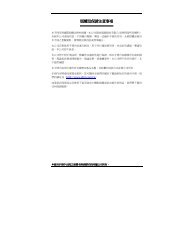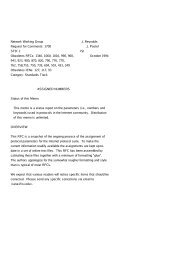- Page 2:
eferred to as "HTTP/1.1", and is an
- Page 5 and 6:
12.1 Server-driven Negotiation ....
- Page 7 and 8:
14.40 Trailer .....................
- Page 9 and 10:
1.2 RequirementsThe key words "MUST
- Page 12 and 13:
Fielding, et al. Standards Track [P
- Page 14 and 15:
equest chain ----------------------
- Page 16 and 17:
Elements separated by a bar ("|") a
- Page 18 and 19:
HTTP/1.1 header field values can be
- Page 20 and 21:
An application that sends a request
- Page 22 and 23:
3.2.3 URI ComparisonWhen comparing
- Page 24 and 25:
Fielding, et al. Standards Track [P
- Page 26 and 27:
is not desirable and is discouraged
- Page 28 and 29:
CRLFchunk = chunk-size [ chunk-exte
- Page 30 and 31:
When in canonical form, media subty
- Page 32 and 33:
3.9 Quality ValuesHTTP content nego
- Page 34 and 35:
RFC 2616 HTTP/1.1 June 1999HTTP/1.1
- Page 36 and 37:
message-body = entity-body| Transfe
- Page 38 and 39:
in advance.Messages MUST NOT includ
- Page 40 and 41:
equested resource, and 501 (Not Imp
- Page 42 and 43:
names) MUST use the following rules
- Page 44 and 45:
values for the first digit:- 1xx: I
- Page 46 and 47:
Fielding, et al. Standards Track [P
- Page 48 and 49:
how the transfer-length of a messag
- Page 50 and 51:
connection-token close.If either th
- Page 52 and 53:
idempotent (see section 9.1.2). Non
- Page 54 and 55:
compatibility with RFC 2068, a serv
- Page 56 and 57:
If at any point an error status is
- Page 58 and 59: optional features implemented by th
- Page 60 and 61: - Extending a database through an a
- Page 62 and 63: intervention (or other means) on th
- Page 64 and 65: 10.1.2 101 Switching ProtocolsThe s
- Page 66 and 67: esponse MAY include new or updated
- Page 68 and 69: Fielding, et al. Standards Track [P
- Page 70 and 71: The response MUST include the follo
- Page 72 and 73: If the client is sending data, a se
- Page 74 and 75: If the response could be unacceptab
- Page 76 and 77: 10.4.15 414 Request-URI Too LongThe
- Page 78 and 79: 10.5.5 504 Gateway TimeoutThe serve
- Page 80 and 81: Fielding, et al. Standards Track [P
- Page 82 and 83: Caching would be useless if it did
- Page 84 and 85: Warning (but without removing any e
- Page 86 and 87: If the user has overridden the basi
- Page 88 and 89: in the past. This means that the re
- Page 90 and 91: RFC 2616 HTTP/1.1 June 1999the time
- Page 92 and 93: simple:response_is_fresh = (freshne
- Page 94 and 95: match.In HTTP/1.1, a conditional re
- Page 96 and 97: validators or strong validators. Cl
- Page 98 and 99: - MAY send a weak entity tag instea
- Page 100 and 101: Unless specifically constrained by
- Page 102 and 103: Fielding, et al. Standards Track [P
- Page 104 and 105: warn-code 1xx, which are deleted ev
- Page 106 and 107: for the associated entity, its enti
- Page 110 and 111: The Accept request-header field can
- Page 112 and 113: image/jpeg = 0.5text/html;level=2 =
- Page 114 and 115: Note: If the request does not inclu
- Page 116 and 117: Accept-Ranges: bytesbut are not req
- Page 118 and 119: containing an Authorization field,
- Page 120 and 121: - Restrictions on what may be store
- Page 122 and 123: improve privacy in some cases, we c
- Page 124 and 125: Fielding, et al. Standards Track [P
- Page 126 and 127: must-revalidateBecause a cache MAY
- Page 128 and 129: understand.For example, consider a
- Page 130 and 131: new coding is known to be acceptabl
- Page 132 and 133: 14.14 Content-LocationThe Content-L
- Page 134 and 135: Note: while the definition of Conte
- Page 136 and 137: server SHOULD return them in the or
- Page 138 and 139: Some origin server implementations
- Page 140 and 141: Expires = "Expires" ":" HTTP-dateAn
- Page 142 and 143: A client MUST include a Host header
- Page 144 and 145: een modified since the date given b
- Page 146 and 147: RFC 2616 HTTP/1.1 June 1999If none
- Page 148 and 149: 14.29 Last-ModifiedThe Last-Modifie
- Page 150 and 151: MAY require that behavior be consis
- Page 152 and 153: yte-ranges-specifier = bytes-unit "
- Page 154 and 155: Content) instead of 200 (OK).- The
- Page 156 and 157: The TE request-header field indicat
- Page 158 and 159:
Fielding, et al. Standards Track [P
- Page 160 and 161:
a cache cannot determine from the r
- Page 162 and 163:
SHOULD NOT, by default, forward the
- Page 164 and 165:
this user agent behavior in mind.Re
- Page 166 and 167:
designers and implementors be parti
- Page 168 and 169:
strongly correlated to the membersh
- Page 170 and 171:
serious security considerations. Co
- Page 172 and 173:
The HTTP protocol has evolved consi
- Page 174 and 175:
Protocol -- HTTP/1.0", RFC 1945, Ma
- Page 176 and 177:
Implementation and Analysis", RFC 1
- Page 178 and 179:
University of California, IrvineIrv
- Page 180 and 181:
Fielding, et al. Standards Track [P
- Page 182 and 183:
Notes:1) Additional CRLFs may prece
- Page 184 and 185:
full compliance with the MIME proto
- Page 186 and 187:
ead chunk-size and CRLF}read entity
- Page 188 and 189:
- understand any valid response in
- Page 190 and 191:
CREATE had a race that required an
- Page 192 and 193:
also needed to be a general header,
- Page 194:
Fielding, et al. Standards Track [P













